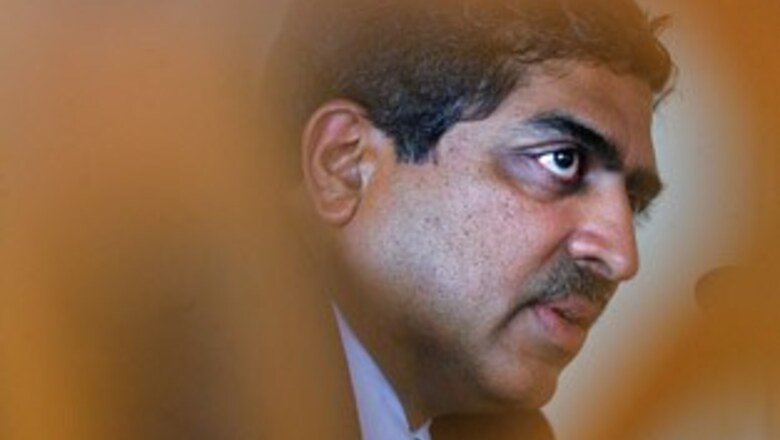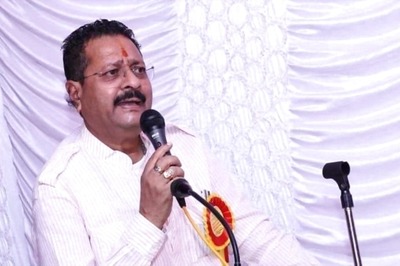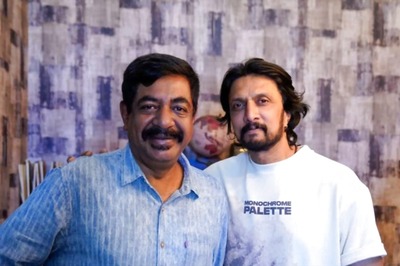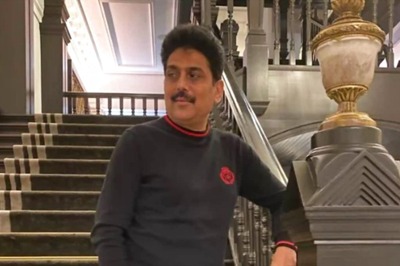
views
ARUN MAIRA
The Mission: Member, Planning Commission. To help the government evolve better policies on urbanisation and industrialisation.
The Difference He Makes: As a consultant, he can locate systemic problems and provide solutions. He is already helping the Planning Commission overcome its inward-looking mindset and open up to feedback from the outer world.
Key Insight “The biggest thing that hits you here is the scale. Anything that you do affects millions of people.”
THE INVITATION

Arun Maira was on a holiday with his wife. He was on a train in Prague when his phone began to buzz. In normal course, he would have been hard-pressed to recognize the caller’s soft, gentle voice amid the rattle and roll of the express train. It was the Indian Prime Minister on the line. Maira had been alerted about it just 15 minutes earlier. In fact, his idyllic vacation had suddenly turned topsy-turvy that morning with an urgent mail and a call from his college batch-mate and deputy chairman of the Planning Commission, Montek Singh Ahluwalia.
Ahluwalia had come to the point straightaway. “The PM would like you to join the Planning Commission. You have rich experience in industry.” Both surprised and taken aback, Maira enquired politely, “It is an honour. Tell me who thought of me.”
“The PM asked for you himself,” Ahluwalia said. “He would personally like to invite you. I am sorry to bother you on your vacation. But are you okay to take a call from him?”
Maira was glad to agree but since he was out sight-seeing, he asked for enough time to rush back to the hotel. But not even 15 minutes had passed when the PM’s call came through. “Arunji, would you accept the invitation to the Planning Commission?” Dr. Manmohan Singh asked. “We need growth which is much more inclusive.” The PM also told Maira he would have a minister’s rank as a planning commission member.
Shailesh Gandhi got his wake-up call some five years ago. Till then, he was running a successful packaging firm with more than 500 employees and a clientele that included many blue-chips. Then one day, an alumni meet changed everything for him. One of his professors chided him: “You used to be so critical about the society. What now? Things have only gotten worse. What have you done?” It tugged at his conscience. By 2003, he had sold off his business and become a Right-to-Information (RTI) activist. He reckoned he could shine the spotlight on governments and force them to be more transparent and improve their performance.
In August 2008, Gandhi heard from his activist friend Arvind Kejriwal. The Manmohan Singh government was appointing four information commissioners. “Why don’t we nominate four, five names from civil society?” Kejriwal asked. Gandhi’s name was one of them. One day, he got a call from Prithviraj Chauhan, minister of state in the PM’s office, inviting him to come on board. He agreed. “Why not be an insider and make a bigger difference rather than just criticising from the outside?” he asks.
In June last year, military veteran Raghu Raman felt he had finally got the break he had always aspired for. He became the CEO of Mahindra Defence Land Systems, a Mahindra-British Aerospace joint venture, a position he had coveted for long. Raman joined M&M in the 1990s and seeded its security business in 2000. Instinct told him it was the right place and the right time to be in, given the growing security awareness around the country. “Everything felt just perfect,” he said.
The moment didn’t last long. In the wake of the 26/11 terror attacks, the government decided to set up a national grid that would link up all the intelligence agencies in the country, under the leadership of Home Minister P Chidambaram. Raman was one of the candidates being vetted by the government to head the NatGrid.
For a while he could not make up his mind. Of course, there was no comparison between the government job and the M&M assignment in terms of money and perks. Besides, taking a plunge would mean giving up the thrill of leading a growing company. Speaking to friends didn’t help. “Some said I am mad to even consider a government offer,” he recalls. Others thought it was a great opportunity. For a while he was torn. But his employers were supportive: “Where is the doubt? You have been called for national service. It’s an honour,” a proud Keshub Mahindra, the chairman, told him.
The government took its time to vet the candidates and complete its due diligence for the critical position. It also gave Raman time to make up his mind. “Once I gave my commitment, the clarity emerged. The amount of difference a civil servant can make [to the country] is of a different caliber altogether.”
NANDAN NILEKANI
The Mission: To launch the world’s most ambitious national identity project.
The Difference He Makes: Renowned networking specialist. Understands building consensus is the first step to bringing big change.
Key Insight: “It is just that the processes here have more cholesterol in them than we are used to. I am not unduly worried about it. That’s a legitimate part of democratic process.”

Nandan Nilekani got his call from the PM towards the end of May 2009. Singh first offered him a Planning Commission job, but Nilekani said he was interested in a more independent role where he could make a larger impact. Leaving Infosys would be a big decision and he could do that only for a challenging assignment. The PM asked him to meet him in Delhi two weeks later.
When told about this, the co-founders of Infosys agreed that this was a significant opportunity for Nilekani and gave their assent without any hesitation.
On June 15, he met the PM privately at his 7, Race Course Road. The meeting lasted half an hour. Singh offered him the role of Chairman, Unique Identity Authority of India, with a cabinet minister’s rank. He would report to the PM and have the freedom to bring the best minds from outside for the project.
Within 10 days, Singh cleared the papers and informed the Cabinet. Within a month, Nilekani was on board.
THE BEGINNING
Maira’s first day at work turned out to be a huge culture shock. He has been given a modest but spacious office at the commission’s headquarters, Yojana Bhawan, replete with a big dining table and the familiar red-green lights outside his room.
PAGE_BREAK
The first time that he stepped out with a spiral note pad, the peon outside stood in front of him with folded hands. Maira was befuddled. What for? Sahebs aren’t supposed to carry any file. So he reluctantly handed over the spiral note pad to the peon.
That same day, Maira had to step out for lunch. He had earlier entered the heavily secured building from the back door with his boss for the swearing in ceremony, but now he was going out alone through the front door. No one recognised him. His secretary had said that the driver was waiting downstairs. But he couldn’t find the car or the driver. He wanted to go back to his room but the security would not let him in. Since it was lunch time nobody was there at the reception to help.
Conscious not to throw his weight around, he was wondering what to do next when the administrative head spotted him and promptly jumped to his rescue. “I am looking for my driver,” Maira said. Drivers had a separate waiting room next door, he was told. Quite naturally, Maira decided to peep in to look for his driver. But that led to a huge flutter in the driver’s room, as if the sky had fallen. It was a monumental breach of protocol.
At Boston Consulting Group, Maira had shared the executive assistant with another colleague. Today, he has seven personal staff--three secretaries, three peons (one for home) and a driver. “Sometimes I struggle with what to do with so many of them.” The man who made his own tea and hopped across to chat with his junior colleagues is learning his lessons in protocol and delegation. At age 66, it isn’t an easy transition to make.
Nandan Nilekani is candid about his big shift. “I was very comfortable in my world. I was doing well and could have stayed on at Infosys till the age of 60. It’s a big risk. I didn’t have to do this… It’s like doing a start-up all over again in a very different world. My prior success in no way guarantees my assured success in this world. If I don’t deliver, then the consequences could be large,” the chairman of the unique identity project says.
Nilekani figured a way to deal with the risks. He spent the first few weeks organising the office and equipment, getting the budget signed and finding the people. He made two quick calls: he chose to retain his informal work style. And he preferred to go out and meet people. “I found that all over the world, if you make an effort and go out to meet people, they welcome it. From our own accord, my team and I have gone and met ministers and secretaries.
The fact that we have done this outreach program has helped dissolve anxieties.”
His brief put him under no compulsion to visit the individual states, but Nilekani did so anyway. The PM had always underscored the importance of taking states along in transformational projects. Most important touch-points for the public distribution system or rural job guarantee scheme are managed by the states. So instead of meeting them in Delhi or sending them a letter, Nilekani chose to meet them in their state to win their support for the project. It worked. His travels took him on a veritable Bharat darshan--including Jaipur, Bhopal, Patna, Dehradun and Shimla--places that he had never been to before. “I have seen more of America than India before this job.” In Bihar, he spent an evening with the secretaries. He then met Chief Minister Nitish Kumar for lunch for over an hour and a half, discussing the details of the project and what it meant for the people of Bihar. “It was a part of creating the momentum for our project,” says Nilekani.
SHAILESH GANDHI
The Mission: Central information commissioner.
The Difference He Makes: As a Right-to-Information advocate, he has been able to make his team work 10 times as fast as any other across the country.
Key Insight: “The frustration is that it’s the small things--not the big ones--that are holding up the government.”

Life as an information commissioner is far from easy. It was a newly created post. The government has given Gandhi a team of eight. But only one is full-time permanent staff and the rest are on contract on a meagre salary of Rs. 7,500 per month. “When you pay such pittance what do you get? Corruption is an obvious side-effect,” he says.
Gandhi realised he was understaffed and that would hobble his progress. That is when he took the decision unheard of in any career setting. He decided to use his salary to hire four interns and top up the salary of the contract staff with some incentives. He figured he had the financial cushion through his personal savings to take the shock. He also got his new staff computers on his own.
PAGE_BREAK
It has been a difficult 17-month journey for Gandhi. “Even the basic things are not there,” he says sitting in a cramped, dingy office with stacks of files all around him. Files still need to be approved on paper. Human resource processes are just so archaic and frustrating. Take for instance the way files are stored. With no cabinets, files are stacked on top of each other. Finding a file isn’t easy.
Gandhi didn’t like the two flaps and the strings used to fasten the files. He asked for removing them. “There was resistance which I could not understand,” he says. He found it difficult, cumbersome and a complete waste of time to tie and untie strings. “I stuck and dispensed with it,” he said. Ideally he would have liked a much neater arrangement with filing cabinets but procurement declined to entertain the request.
His trip to attend a Right-to-Information conference in Bangladesh was a touch-and-go affair. His travel file had to be cleared, physically. His joint secretary spent three days chasing the file which went all the way up to the prime minister’s office for clearance. The approval came at the last moment.
Raman has clearly had an easier time settling in. His office at Vigyan Bhavan, New Delhi’s premier conference and office complex, is up and running. He has had the freedom to put together his team with guidance from his colleagues. Since the time he took charge in December, there’s been a spate of applications on his table. People from both within and outside the government want to work for him. Home Minister P Chidambaram, known for his reputation for clinical efficiency, is supportive and intervenes to untangle any crossed wires. With such a conducive atmosphere, it hardly matters that Raman’s official car is an old Ambassador that former President Shankar Dayal Sharma once rode.
THE NURTURING
Maira has arrived at an interesting time. The Planning Commission is at the cusp of change. For years, it functioned as a budgeting organisation, detailing where and how much the government spent money. Today, as the private sector grows in size, its role is changing to that of a facilitator, to build a healthy ecosystem, nourish the industry and assess the nation’s future needs. The focus has to now shift to shaping strategies and philosophies, rather than directing budgets. The commission needs new capabilities, but it has to do with the same infrastructure and the same set of people. “It is like re-designing an aircraft while flying,” says Maira.
As a heavyweight consultant, Maira has a recipe to deal with the inward-looking culture. As a starting point, he’s relying on better feedback from outside. “The quality of people that the commission needs to work with has to be different and deeper,” he says. He is beefing up the quality and the level of engagement—by reaching out to all stakeholders, industry, ministries and people. Maira’s big areas of focus: urbanisation and industrialisation.
CAPT. RAGHU RAMAN
The Mission: Head, National Intelligence Grid. To help evolve an efficient system for the flow of information among official agencies.
The Difference He Makes: Has experience both in government and industry. Can make the two work together, using informal link-ups.
Key Insight: “This will not be easy. But life isn’t about seeking easy jobs.”

Last year when he took charge, he had an interesting one-day offsite with the Confederation of Indian Industry (CII). He listened to what the industry needs and what would they require from the government, while at the same time, outlining the government’s desire for inclusive growth. This was done ahead of the mid-term appraisal so that the feedback could be factored in.
For example, the issues of land reforms came up. There was a time when the government acquired land for public works. While people were compensated in some ways, the land went back to the people in the form of a public infrastructure. Today when the government acquires land for the private sector, it is almost like “public good for private gain.” Something clearly isn’t acceptable. Therefore it is important for private enterprises to take people into confidence and give them a fair deal. States like West Bengal stand as a glaring example of what has gone wrong and what has gone right. Some like JSW got it right by tuning into the locals, making them a stakeholder. “The only way to do this in a democracy is to build relationship with people and work with them. The message is coming out loud and clear that the industry has to be more effective in reaching out to people,” he says.
Several weeks ago, the prime minister invited all the members of the Planning Commission. He gave each of them 10 minutes to talk about one or two areas in which they would want the PM’s support. Maira picked urbanisation and climate change. He said while the focus on rural growth, agriculture is important, urbanisation is something of immense importance. “Soon India will have half its population living in cities. We need to much more actively guide the urbanisation policy,” he told the PM. Each locality needs to take charge. “You can’t design detail top down,” he says. Skills at the local level need to be built. “People get elected (to local bodies) but they don’t [know] how to manage, conduct meetings effectively. Since we don’t know how to manage effectively we expect some higher authority to take charge.” The government now plans to achieve this by having a national programme for training local representatives and leaders.
PAGE_BREAK
Given the sensitivities of his assignment, Raman is hesitant to discuss specifics. But he shares a flavour of his early days. Shortly after he took over, he sent out 40-50 emails to people he knew in the private sector whom he thought could help in different ways in his assignment. People from some of the best organisations have responded wanting to help and work, many of them pro bono. They will work on short stints at different points of time. “This ability to draw upon private sector in a slightly informal manner is what I bring,” he says.
The databases that will feed into the NatGrid includes telephone records, banking transactions, travel, lodging and all forms of communications. This will require liaising deeply with a diverse set of companies and also helping deal with their concerns and needs. “I now understand the government needs. I also understand how a corporation functions. It is my ability to fuse the two together that helps,” he says.
Nilekani’s mantra is consensus building. “The big difference in private and public is that in private sector, your consensus building is within the frame of your own company – your management team and the board. Here it cuts across a whole different set of stakeholders who have different points of view, which involves more work. It’s a much more amorphous world than I am used to,” says he.
Nilekani has met regulators like RBI, 20 state governments, microfinance institutions, telecom operators etc. to build consensus and get them engaged. That includes a workshop at the Indian Institute of Advanced Studies, Shimla, for a bunch of voluntary groups and sociologists and another at the National Law School, Bangalore, for legal professionals. “At the end of the day, our biggest guarantee of success is if people want the ID,” he says. His challenge is to make people feel that their lives will be made better and more convenient by getting the number. So, he is talking to a diverse set of potential users like farmers, urban poor and beneficiaries of the rural job guarantee scheme. “It’s just that the processes here have more cholesterol in them than we are used to. I am not unduly worried about it. That’s a legitimate part of democratic process,” he says.
He spends a lot of time evangelising the concept. He envisages a massive team of volunteers who would work with him on the project. His brand and status help open doors but it cuts the other way as well. “Some people might feel that I am from the private sector--and [wonder] will I understand the public space or problems of the poor or know how to navigate.” All told, he reports a positive response from his interactions.
Gandhi’s team is on a roll. It has cleared 5,800 cases in 2009 as against the national average of 600. But 17 months after taking up the assignment, he understands the institutional challenges better. “If you had spoken to me a year back, the only thing I would have talked about is RTI. Today, I think administrative reforms are far more compelling to make anything happen in the government,” he says.
Commissioners don’t have enough staff. “Why appoint them if you cannot equip them,” he says. But change is on the anvil. Papers have begun to be scanned. Files are being digitized. Soon, information commissioners will deal with only electronic files. “The frustration is that it’s the small things–-not the big ones—that are holding up the government,” he says. By the time his term ends in 2012, Gandhi will hopefully witness the change that brought him into the government.
(Additional reporting by Mitu Jayashankar)



















Comments
0 comment